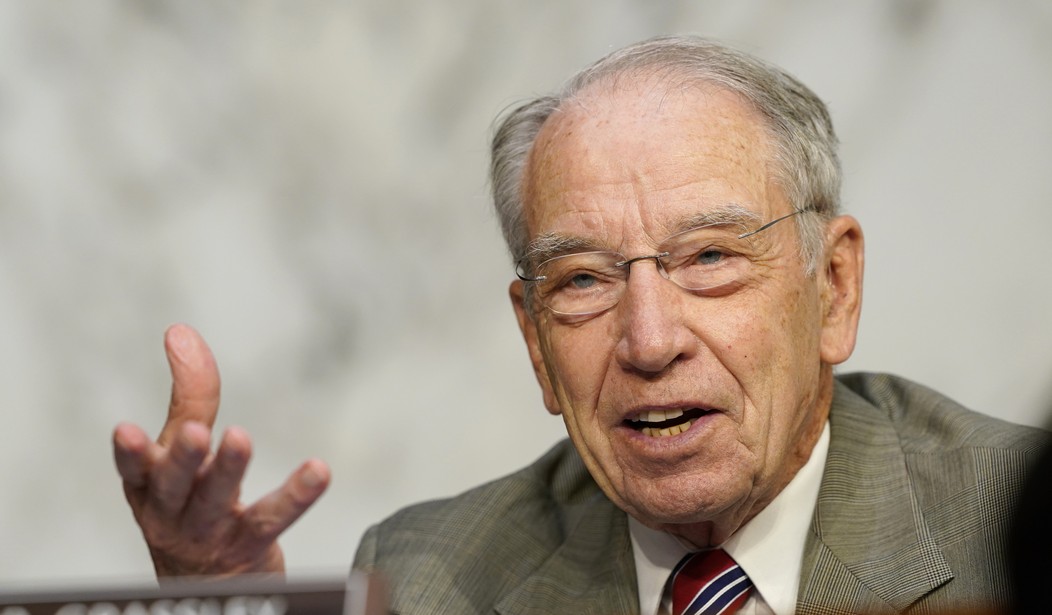Sen. Chuck Grassley of Iowa, the president pro tempore of the Senate and the longest-serving Republican in that body, sent out a tweet last week lamenting the imminent demise of an ancient and admirable Senate tradition.
"US Senate has NEVER convened a Congress on Sunday out of respect," said Grassley.
"Not once in 231 yrs," he said.
Grassley went on to note that the Constitution calls for Congress to convene its new sessions on Jan. 3 each year but also allows Congress to enact a law changing that date.
Historically, in those years when Jan. 3 fell on a Sunday, Congress would change it. This was "usually done," Grassley noted, "by unanimous consent."
But not this year -- and Grassley said he did not know why.
As originally ratified, the Constitution made it impossible to convene a new session of Congress on a Sunday, unless Congress specifically enacted legislation requiring that to happen. Article 1, Section 4, Clause 2 of the Constitution said: "The Congress shall assemble at least once in every year, and such meeting shall be on the first Monday in December, unless they shall by law appoint a different day."
In 1933, the states ratified the 20th Amendment to shorten the lame-duck terms of congressmen and presidents who had retired or been voted out of office. It required congressional terms to end on Jan. 3 and presidential terms to end on Jan. 20 (rather than March 4) and said this about sessions of Congress: "The Congress shall assemble at least once in every year, and such meeting shall begin at noon on the 3rd day of January, unless they shall by law appoint a different day."
Following the ratification of this amendment, according to the website of the U.S. House of Representatives, the 73rd Congress convened its 1934 session on Jan. 3. The 74th Congress also convened its 1935 session on Jan. 3 and its 1936 session on Jan. 3.
Recommended
But the 75th Congress first convened on Tuesday, Jan. 5, 1937. Why? Because Jan. 3 was a Sunday.
"When the 3d of January fell on Sunday (in 1937), Congress did by law appoint a different day for its assemblage," notes a congressional website on the Constitution.
In fact, Congress has often moved the opening date for a new session even when it would not otherwise have fallen on a Sunday.
"In recent years, it has been the exception rather than the rule for a new Congress to begin on January 3," the Congressional Research Service reported in 2018. "Nine of the past 12 Congresses began on a date other than January 3."
So, why not in 2021, when Jan. 3 falls on a Sunday?
House Majority Leader Steny Hoyer offered a vague reason in a press briefing on Dec. 2.
"I've put out a notice," Hoyer said that day, "which says members ought to plan on being here on the 3rd."
"But the Constitution also says we can set alternate dates," said Hoyer. "And frankly, we have set alternative dates more frequently than not."
"Unfortunately, that's a Sunday," Hoyer said of this Jan. 3. "It is inconvenient for members, but the Constitution says we can have an alternative date. But it needs to be set by law, so that we would have to pass a bill, the Senate would have to pass a bill, and the president would have to sign a bill.
"We're not sure that can be done," said Hoyer. "So, we're providing and letting members know that Sunday, the 3rd at 12 noon is the date that they ought to be expecting to show up and be sworn in to the Congress."
In the almost nine decades since ratification of the 20th Amendment, successive Congresses have been able to pass laws changing the date when a session of Congress would convene if Jan. 3 fell on a Sunday.
But not this Congress.
On this Sunday, as the Senate was in session working on a $900 billion COVID-19 relief bill, Grassley spoke in defense of this tradition the Senate is about to kill.
"For the first time in history," Grassley said in his prepared remarks, "Senate Democrats won't agree to unanimous consent and instead are insisting the Senate start the 117th Congress on a partisan foot."
"Never in Senate history has the Senate convened a Congress -- meaning a new Congress -- on a Sunday," Grassley said on the Senate floor.
"But, out of respect, the Senate usually does not have business on religious holidays observed by members of various faiths," said Grassley.
"I also think the Lord's Day, paired with the weight of starting a new Congress, deserves reverence," he said.
Many Democrats in Congress apparently do not.

























Join the conversation as a VIP Member